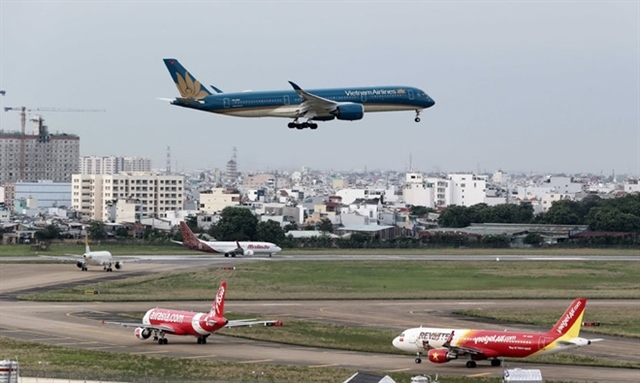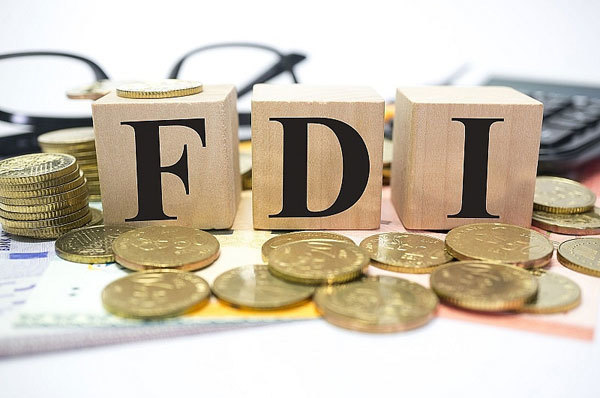with financiers calling for relaxation of foreign ownership limits.
|
|
| More thrust to propel foreign investment in aviation. Photo: Shutterstock |
According to industry insiders, nearly one year since issuance of Decree No.89/2019/ND-CP on civil aviation conditional business lines, little impact has been seen in the market due to the global health crisis and a lack of factors to motivate investment.
Decree 89, which replaced Decree No.92/2016/ND-CP from 2016 and amends and supplements articles related to the provision of conditional business lines in civil aviation, aims to create favourable conditions for enterprises not only to set up airlines but also to invest in airports.
The decree has made two notable changes for airlines: increasing the foreign ownership limit (FOL) of charter capital from 30 to 34 per cent, and lowering the minimum capital requirement for establishing airlines providing international routes.
Vaibhav Saxena from Vietnam International Law Firm (Vilaf) told VIR, “In theory, this should provide greater opportunities for domestic airlines like Vietjet and Bamboo to raise foreign capital and expand. At the same time, the new decree is expected to lower entry barriers and increase competition. However, the practical impact of Decree 89 on the market has been limited.”
Over the last year three airlines – Vinpearl Air, Vietravel Airlines, and Kite Air – have been trying to get an operation license. However, with the tight market conditions due to COVID-19, the Ministry of Planning and Investment has petitioned the prime minister to delay considering the establishment of new airlines until the aviation market recovers, effectively blocking the establishment of Vietravel Airlines and Kite Air. Vinpearl Air also withdrew from the market, citing concerns about a potential oversupply.
“Many have argued that the FOL rise of 4 per cent is simply not enough to attract foreign investors,” Saxena noted.
John Frangos, a partner in Bangkok-based Tilleke and Gibbins office who leads its regional aviation practice, said that CoVID-19 is having a devastating effect on Southeast Asia’s airline industry. Most countries’ borders are closed to international travellers, and domestic flights are not enough to sustain many airlines. For this reason, airlines are unlikely to expand investments at this time.
“They are instead focusing on how to keep financially afloat until travel can safely resume. This means the airlines with strong financial reserves will be in a better position to ride out this challenge. But low-cost carriers with razor-thin margins will face difficulty. Until airlines and aviation investors have a better picture of when international travel will safely resume, they will continue to be very cost-conscious and minimize new investment plans, including in Vietnam,” he explained.
According to the International Air Transport Association (IATA), Vietnam will become the world’s fifth-fastest-growing aviation market, increasing by an average of 15 per cent in the coming years and reaching 150 million passengers in 2035. However, there are still factors that will help attracting investors.
The IATA advised the country to complete new aviation infrastructure projects, highlighting Phase 1 of Long Thanh International Airport in the southern province of Dong Nai. The $5.45 billion T1 Terminal will be able to accommodate 25 million passengers a year. This aligns with the government’s plan to invest in airport infrastructure across the country to improve capacity and efficiency. One of the key projects under this initiative is the expansion of the $470 million T3 Terminal at Tan Son Nhat International Airport and the construction of the new T4 Terminal.
What is more, airlines and service providers alike are coiled and ready to strike when tourism rebounds from COVID-19. Last year, foreign tourists accounted for about 15.6 per cent of all air passengers (115 million) in Vietnam.
Tourism had been on a steady rise in recent years and historically has a tendency to bounce back quickly from epidemics or financial crises. Vietnam’s largest sources of tourists are China, South Korea, and Japan (accounting for about 61 per cent of international arrivals) and these countries have shown some progress in the handling of the pandemic.
Another motivating factor for aviation could be the VND12 billion ($521,740) relief package for Vietnam Airlines – if the government approves it.
Over the past nine months, Vietnam Airlines has accumulated big losses, and had to increase its short-term debts to stay afloat, but relief proposals and/or the offering of convertible bonds are still being considered. If approved, it may buttress the entire domestic aviation industry as Vietnam Airlines is still the market leader in the premium segment.
These silver linings could be enhanced by further relaxation of the FOL. Saxena from Vilaf suggested that Vietnam should look to examples of other countries in the region. For instance, in Thailand the rate is set at 49 per cent, while in Malaysia it is 45 per cent, and in Indonesia 49 per cent.
Under Thailand’s new 4.0 economic model, the private sector will be allowed to invest in airports via public-private partnership (PPP) projects while foreign companies will be able to handle airport management and hold more than 51 per cent in maintenance, repair, and overhaul (MRO) centres.
According to the US Department of Commerce, the need for MRO services in Vietnam will grow dramatically as fleets are growing at the rate of 13.3 per cent a year, along with extensive infrastructure investment. However, 75 per cent of the services are outsourced and existing MRO providers only meet about 25 per cent of the demand.
“Under the current laws, foreign investors can only hold 30 per cent in MRO companies in aviation – raising the rate could attract investors. Policies need to be further relaxed to fall in line with international business standards while meeting both the expectations of businesses and Vietnamese market players,” Saxena stressed. VIR
Bich Thuy

EVFTA will broaden skies for aviation across Vietnam
Never-before-seen activities in Vietnam’s aviation sphere are expected to come to EU businesses soon on the back of the landmark EU-Vietnam Free Trade Agreement.

Foreign investors allowed 34 percent holding at Vietnamese airlines
The limit for foreign investors’ ownership in Vietnamese air transport businesses will be increased to 34 per cent from the current 30 per cent, according to a prime minister’s decree signed last week.
